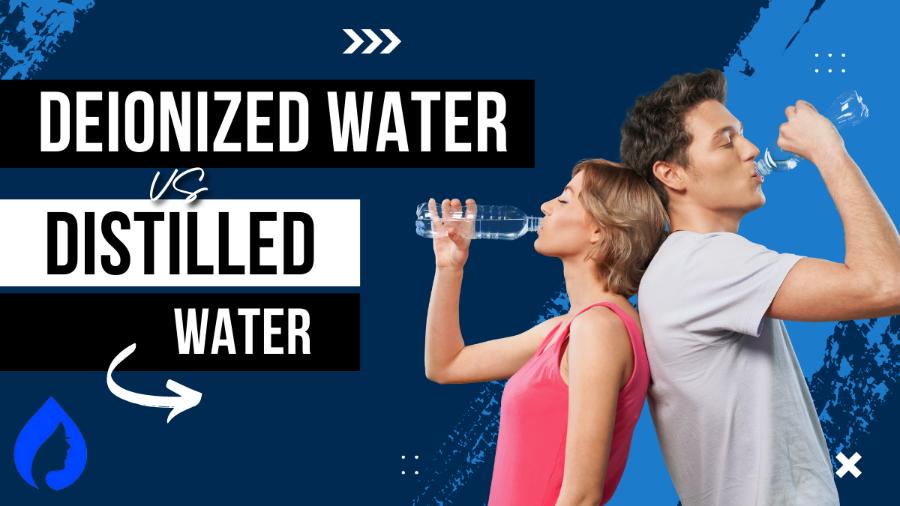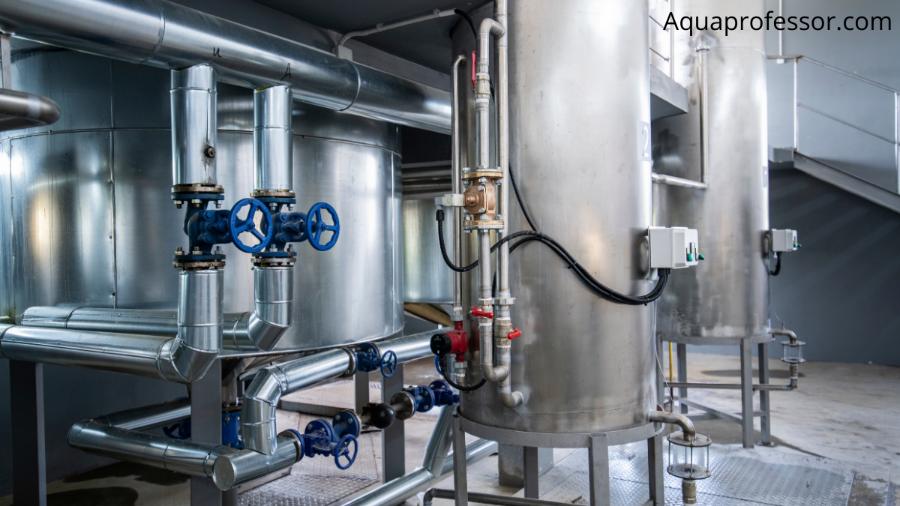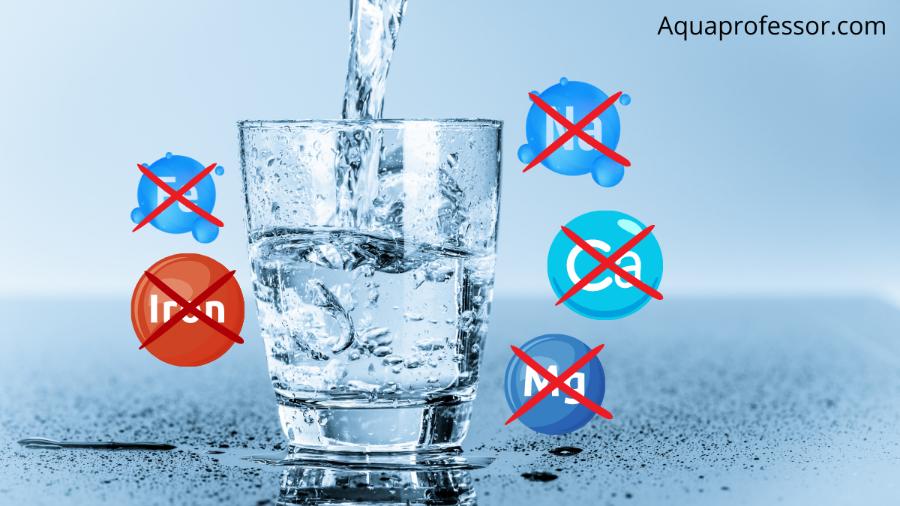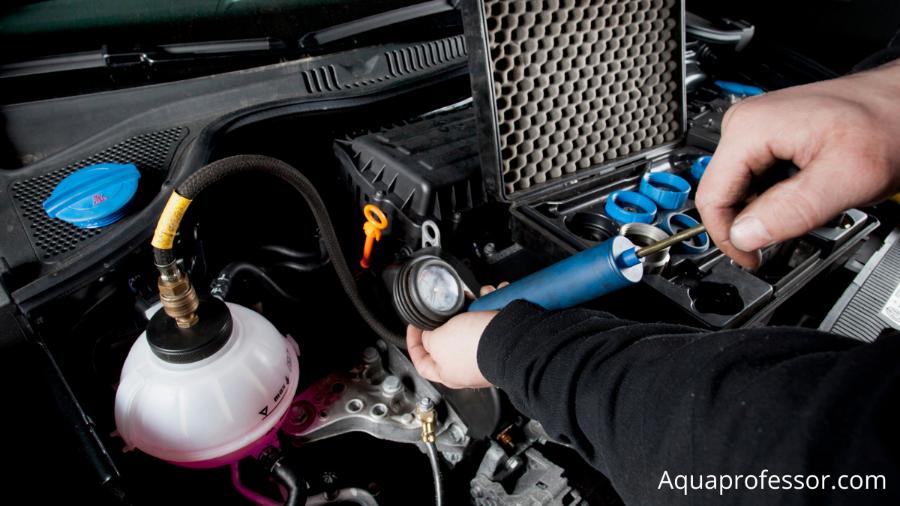
The primary difference between deionized and distilled water is how they are prepared and their purity levels.
Although both kinds of water are safe to drink, a cation or anion exchange system is used to purify water into deionized water. In contrast, distilled water results from boiling tap water until the impurities evaporate into the air.
Keep reading for head-on deionized water vs distilled water comparison in terms of processing, mineral content, and purity standards for drinking.
5 Differences Between Distilled and Deionized Water
| Parameters | Distilled Water | Deionized Water |
| How is it prepared? | Boiling water | cation/anion exchange system. |
| What Gets Removed? | Purer | ions with positive and negative charges. |
| Which Is Purer? | More pure | Less pure |
| How easy to obtain + cost differences | Complicated to obtain [$0.30/glass] | Easy to obtain [$4/glass] |
| Other uses | Used in household appliances | In RO systems and industries. |
Distilled vs Deionized Water: How Are They Prepared?

Deionized Water
Ions are negatively or positively charged atoms or molecules found in water. “Cations” refer to positively charged ions, while “Anions” describe negatively charged ions.
What is deionized water?
Deionized water (sometimes referred to as “DI water” and “Demineralized water“) is a type of high-quality, ultrapure water that is produced by ion-exchanging (or “deionizing”) regular tap water to remove all traces of dissolved solids, dissolved gases, dissolved solids, and other impurities.
That indicates no mineral ions or salts, such as sodium or potassium ions, are present.
Distilled Water
Distillation, one of the first water purification techniques, is still reliable for eliminating most contaminants.
To make distilled water, you must boil tap water to turn it into a vapor. Then the vapor must be condensed back into the water in another container.
Since some contaminants do not evaporate at water’s boiling point and have higher boiling points, they are left behind in the original container to be boiled away.
What Gets Removed?

The distillation process removes all the contaminants and harmful compounds having a higher boiling point than that of water. This includes:
In addition, it destroys germs like viruses, most bacteria, and protozoan cysts when used appropriately. Distillation is also helpful in eliminating the following:
?Note
People often complain that distilled water has a “bland” flavor because the distillation process eliminates the minerals that give water its pleasant taste.
Deionized water is made by exchanging some of the water’s dissolved ions with others using an ion exchange resin in water purification systems.
The deionization process eliminates dissolved particles like salt (sodium chloride), minerals, carbon dioxide, volatile organics, organic pollutants, ionic impurities, and nearly all minerals & organic matter.
Also Read: 5 Best Filters For Fluoride and Chlorine
Which Is Purer?
Which is purer between Distilled and deionized water is fully relative to your use case:
How Easy is it to Obtain (& Cost Differences)
The process of distilling water is the most labor-intensive and requires special equipment. Distilling water is frequently less cost-effective in industrial applications because the typical home water distiller takes 4 to 6 hours to produce a single gallon of filtered water.
The manufacturing cost of distilled water is just a little higher than that of deionized water.
With the cost of water and electricity to run the distiller factored in, the price of a glass of distilled water comes to approximately 30 cents.
However, the deionization process can be completed rapidly, especially when a mixed bed resin chemical process is employed and the water only has to pass through it once.
Deionizing units require electricity, but because they can create a whole batch of deionized water in minutes rather than hours, they consume significantly less power than water distillers.
The cost estimate of 1 gallon of deionized water is around $16 to $17.
Other Uses

Deionized Water
DI water has a wide range of commercial applications:
Distilled Water
Distilled water is often used in lead-acid batteries and:
Is Deionized Water the Same As Distilled Water: Conclusion
Simple answer: NO
While deionized water and distilled are among the many types of pure water, they are made by entirely different methods. Distilled water is a type of highly purified water that has been heated to remove pollutants like chlorine and dissolved solids.
Deionized water is purified water from which all dissolved mineral particles have been eliminated.
You can often substitute deionized (DI) water for distilled water. Still, it’s important to remember that even deionized water might include other contaminants like germs.
Conclusion:
Distilled water is better for drinking, whereas DI water is best used in cooling applications and as “water for injection.” However, filtered tap water remains the best for drinking and household tasks. It’s better to avoid bottled water as it’s expensive and may contain microplastics.
Deionized Water vs Distilled: FAQs
Can distilled water conduct electricity?
No, distilled water cannot conduct electricity since it lacks the ions that make deionized a good conductor of electricity.
What is the deionized water formula?
Deionization is the process of removing the positive (cations) and negative (anions) charged ions from water and replacing them with Hydrogen and Hydroxyl ions, resulting in pure water whose formula is H2O.
What is the difference between RO and DI water?
Reverse osmosis can remove solids and enhance the water supply, but the water remains full of salts and oxygen even after the process is complete. These salts and oxygens are removed from deionized water, but the dissolved solids remain.
Can you drink deionized water?
Drinking deionized water is not recommended, but you can do it in cases of emergency. It’s because it has zero ions present and may damage the intestinal mucosa and slow the body’s metabolic rate. It’s also claimed that deionized water does not quench thirst as well.
Is deionized water corrosive?
Deionized water is particularly corrosive due to the absence of ions. Due to the low hardness of deionized water, it can even corrode carbon steel. Its tendency to absorb carbon dioxide from the air makes it more corrosive than distilled water.

Naina has a profound understanding of how water quality affects our overall well-being. Her expertise is a guiding light for those seeking to live a healthy life. Besides raising awareness, her write-ups provide practical advice on identifying and mitigating water-related issues.
